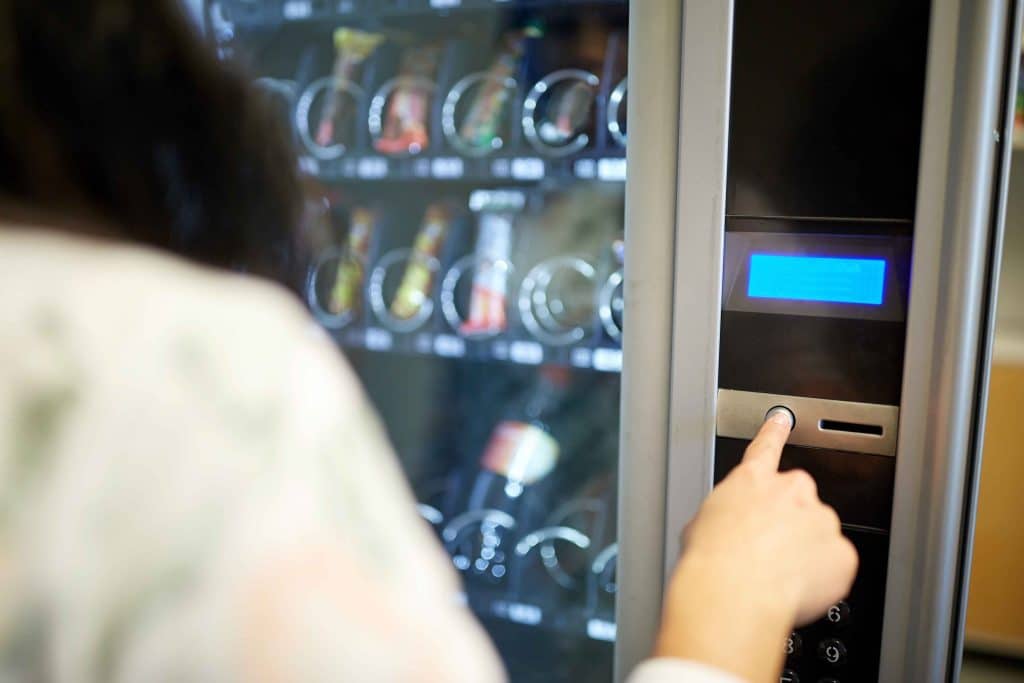The cost of a smart vending machine, a vital aspect to contemplate before investing in this technology, encompasses a myriad of factors. One must take into account not only the initial purchase price, but also the ongoing operational expenses, maintenance fees, and potential return on investment.
This discussion seeks to unravel these interconnected elements and present a detailed understanding of the true cost and potential profitability of smart vending machines. The question remains: what is the real cost of a smart vending machine and is it a worthwhile investment?
Get Free Consultation
Key Takeaways
- Smart vending machines have varying costs influenced by machine complexity, brand reputation, and advanced features.
- Operational costs include maintenance, utilities, restocking, and inventory management.
- High-traffic locations significantly boost the revenue potential, helping offset the initial investment and operational costs.
- Technological advancements like AI, IoT, and contactless payment systems not only improve user experience but also enhance operational efficiency.
Understanding the Basics of Vending Machine Costs
In order to ascertain the financial implications of acquiring a smart vending machine, it is critical to comprehend the essential costs involved. This includes the initial purchase price, the variation in costs across different types of vending machines, and any additional setup expenses. These fundamental elements collectively constitute the initial investment required for a smart vending machine.
Initial Purchase Price
Understanding the initial purchase price of a smart vending machine is crucial to evaluating its overall cost-effectiveness and return on investment. The cost of vending machines varies greatly, depending on their features and capabilities. Generally, the price of a basic smart vending machine starts from $3,000 and can go as high as $18,000 for a digital vending machine with advanced functionalities.
Factors influencing the vending machine cost include:
- The complexity of the machine: More advanced smart vending machines usually cost more.
- Brand and quality: Premium brands usually come with a higher price tag.
- New or used: Used machines can be cheaper, but they might require more maintenance or lack latest features.
Ultimately, understanding how much does vending machines cost can guide your decision on how much to buy a vending machine.
Types of Vending Machines
To accurately determine vending machine costs, it’s important to contemplate the different types of machines available in the market, each with its unique features and price points. Traditional vending machine stores offer a variety of models, from basic snack dispensers to sophisticated smart vending systems. Automated stores often feature digital vending machines with touch screen interfaces, providing a seamless shopping experience. These unmanned stores are powered by smart vending software, offering advanced features like remote inventory management and data analytics. High-tech models, such as a touch screen vending machine, are typically pricier than their traditional counterparts, but they can offer significant benefits regarding operational efficiency and customer satisfaction. The type of vending machine chosen greatly influences the overall cost.
Read more about our Smart Vending Solutions!
Additional Setup Expenses
Beyond the initial purchase price of the machine, potential owners commonly encounter various other setup expenses that greatly contribute to the overall cost of a vending operation. These costs can be broken down into three primary categories:
- Location Costs: This includes the rental fee or commission given to the location owner where the machine is placed. The exact cost varies depending on the location’s foot traffic and the agreement with the property owner.
- Maintenance and Repairs: Regular service and occasional repairs are essential to keep the machine in top working condition. This includes parts replacement, routine cleaning, and resolving unexpected issues.
- Inventory Restocking: The cost of goods sold within the machine needs to be replenished regularly. This expense depends on the types and quantity of products sold.
These additional expenses should be considered during the planning phase to make a successful vending operation.

Operational Costs of Running a Vending Machine
Operational costs are a significant aspect to take into account when evaluating the total expenditure of a smart vending machine. These costs, which include maintenance and repairs, utility expenses, and restocking and inventory management, can substantially impact the overall profitability of the vending machine business. By understanding these costs, proprietors can make informed decisions about managing their vending machines effectively.
Maintenance and Repairs
In the domain of operational costs, the maintenance and repair of a smart vending machine represent significant expenditures to consider. These costs can vary widely depending on several factors:
- Frequency of Use: Machines that are used heavily and frequently may require more regular maintenance and repair.
- Age of the Machine: Older machines often require more frequent and costly repairs than newer, more technologically advanced models.
- Quality and Type of Machine: High-quality machines may require less frequent repairs, but when they do need maintenance, it can be more expensive due to the cost of specialized parts or expertise.
Utility Expenses
Utility expenses constitute another integral aspect of the operational costs associated with running a smart vending machine. These costs include electricity for powering the machine and internet connectivity for its smart features. Electricity costs can vary based on the machine’s power requirements and the local cost per kilowatt-hour. Similarly, the cost of internet connectivity can differ depending on the data plan and the provider chosen, but it is essential for remote monitoring and digital payment processing. Some machines also have refrigeration or heating elements, which can greatly increase utility expenses. Therefore, when calculating the total costs of owning a smart vending machine, potential owners should take into account these recurring utility expenses to get a realistic picture of the overall expenditures.
Restocking and Inventory Management
Beyond the area of utility expenses, managing inventory and restocking also represent significant operational costs for smart vending machine owners. It’s important to maintain an ideal inventory level to guarantee profitability and customer satisfaction. Poor inventory management can lead to overstocking, resulting in wastage or understocking, causing lost sales.
The primary considerations include:
- Product Sourcing Costs: The price of purchasing the products to be sold in the vending machine.
- Inventory Carrying Costs: The cost of storing the products, including warehousing, insurance, and depreciation.
- Restocking Costs: These include the labor costs associated with replenishing the vending machine and transportation expenses.
As a result, efficient inventory management and restocking strategies could significantly reduce operational costs and increase the profit margins of a smart vending machine business.
Revenue Potential and Profitability
Exploring the revenue potential and profitability of a smart vending machine, we will focus on three key points: Earning Potential, ROI Analysis, and the Impact of Location. These factors play an important role in determining the financial success of a vending machine business. By understanding these aspects, potential investors can make informed decisions about whether this venture aligns with their financial goals.
Earning Potential
Delving into the earning potential of a smart vending machine, it’s important to examine both the revenue potential and the profitability of this investment. The revenue potential for such machines can be significant, particularly in high traffic areas where the demand for convenient, on-the-go products is high.
However, the profitability of this venture is equally important. Factors to take into account include:
- The cost of the machine and its maintenance.
- The cost of inventory and its replenishment.
- Operating expenses, such as energy consumption and payment processing fees.
Essentially, the earning potential of a smart vending machine depends not only on its revenue generating abilities, but also on its associated costs and how effectively these are managed.
ROI Analysis
To fully understand the financial implications of investing in a smart vending machine, it is necessary to conduct a detailed ROI analysis, factoring in both the revenue potential and the profitability. This entails a thorough examination of the initial investment cost for the machine and its operation, and the anticipated income that it can generate.
Revenue potential can be calculated by estimating the average number of sales per day and the profit margin for each product. Profitability, on the other hand, includes considerations of ongoing costs such as maintenance, restocking, and potential software updates. Striking a balance between high revenue and low operating costs ultimately determines the return on investment and the financial viability of a smart vending machine.

Impact of Location
The geographical positioning of a smart vending machine greatly influences its revenue potential and profitability, making location a critical factor in driving sales and ensuring a healthy return on investment.
Several aspects come into play when considering the location:
- High-Traffic Areas: Placing vending machines in areas with high foot traffic, such as shopping centers, universities, or transportation hubs, can substantially increase sales volume.
- Accessibility: Locations that are easily accessible and visible tend to attract more customers, leading to higher profitability.
- Demographics: Understanding the demographics of the location is key. Areas with a higher concentration of individuals likely to use vending machines (students, office workers, commuters) can improve sales and profit margins.
Strategically choosing the location can maximize a smart vending machine’s profitability.
Future Trends in Vending Machine Investment
Looking ahead, the vending machine industry presents several key trends that potential investors should consider. These include rapid technological advancements that could redefine the consumer experience, market growth opportunities driven by changing consumer behaviors, and sustainability initiatives that could enhance cost efficiency. Each of these developments could greatly impact the investment landscape for smart vending machines.
Technological Advancements
Increasingly, technological advancements are shaping the future trends in vending machine investments, pushing boundaries and expanding possibilities for investors and consumers alike. This evolution is driving a transformation in the vending machine industry, prompting a shift from traditional models to smart, interconnected devices.
Key advancements include:
- Artificial Intelligence (AI): AI-driven vending machines can analyze consumer behavior, optimize inventory, and improve customer service.
- Internet of Things (IoT): IoT-enabled machines can provide real-time inventory tracking, predictive maintenance, and remote management.
- Contactless Payment Systems: These systems enhance user convenience and hygiene, fostering increased usage.
These technological leaps not only enhance vending machine functionality but also create avenues for diversified revenue streams, positioning smart vending machines as a promising investment opportunity.
Protect your vending technology from cyber threats. Read more!

Market Growth Opportunities
As these technological advancements continue to redefine the vending machine industry, they concurrently present new market growth opportunities and future trends for investors to explore. Increased consumer demand for convenience, coupled with enhanced user experience, drives potential for significant returns. Moreover, the integration of AI and IoT technologies into vending machines expands their utility beyond food and beverage dispensing, opening avenues for retail and service-focused applications. The incorporation of cashless and mobile payment options also caters to the digital-savvy consumer, creating further growth potential. Forecasted market expansion, particularly in developing economies, presents investors with lucrative opportunities. However, while tapping into these market potentials, investors must also be wary of evolving consumer preferences, regulations, and technological disruptions.
Sustainability and Cost Efficiency
In the domain of vending machine investments, sustainability and cost efficiency emerge as pivotal future trends to ponder. The shift towards environmentally friendly solutions and a keen focus on reducing operational costs are driving innovations in the vending machine industry.
Key areas to contemplate include:
- Energy Efficiency: Smart vending machines are increasingly employing energy-saving technologies like LED lighting and efficient refrigeration systems, reducing electricity expenses.
- Eco-friendly Materials: The use of biodegradable or recyclable materials in packaging and machine construction is a sustainable trend helping to minimize environmental impact.
- Intelligent Inventory Management: Leveraging AI and machine learning for optimized inventory management can decrease wastage and enhance profitability.
These factors underline the potential of smart vending machines in combining sustainability with cost efficiency.
Conclusion
The investment in a smart vending machine encompasses not just the immediate financial outlay but also a commitment to a dynamic, evolving form of retail technology. Initial costs, while variable, are just one piece of the financial puzzle. Prospective investors must also weigh ongoing operational expenses against potential returns, which are influenced by strategic placement, the machine’s technological sophistication, and market trends. As we have seen, smart vending machines offer a unique blend of accessibility, customized user experiences, and operational efficiency, making them a compelling proposition for those looking to capitalize on the fast-paced world of automated retail.
Ultimately, the worthiness of investing in a smart vending machine lies in its ability to meet the modern consumer’s demand for efficiency, quality, and interactive shopping experiences. As technology advances, the capabilities of these machines will only grow, promising not only to enhance operational efficiencies but also to offer richer, more personalized consumer interactions. This forward-looking approach suggests that the investment in smart vending technology is not just about entering a new market niche but about positioning oneself at the forefront of the retail revolution.
Vending Solutions
With our smart vending solutions, grab-and-go shopping gets simpler, faster, and more personalized.
Frequently Asked Questions
What Type of Products Can a Smart Vending Machine Dispense?
A smart vending machine can dispense a wide range of products, from snacks and beverages to electronics and personal care items. Its advanced technology allows for versatile and customizable product offerings, catering to diverse consumer needs.
How User-Friendly Are Smart Vending Machines for the Average Consumer?
Smart vending machines are designed with user-friendliness in mind. Their intuitive interfaces make navigation simple for the average consumer, and digital payment options further enhance the ease of transaction. Hence, they are highly accessible to users.
How Does the Connectivity of Smart Vending Machines Function?
Smart vending machines function through internet connectivity, often using WiFi or cellular networks. This enables real-time inventory management, sales tracking, and customer interaction, enhancing operational efficiency and user experience.
Can Smart Vending Machines Be Customized to Fit Specific Business Needs?
Absolutely, smart vending machines can be tailored to unique business requirements. For instance, a gym could customize its machine to offer protein shakes and workout gear, enhancing convenience for its health-conscious customers.
What Are the Maintenance Requirements for a Smart Vending Machine?
Smart vending machines typically require regular servicing for ideal functionality. This includes software updates, hardware inspections, and, if needed, repairs. Additionally, regular restocking and cleaning are necessary to maintain a hygienic and efficient machine.

